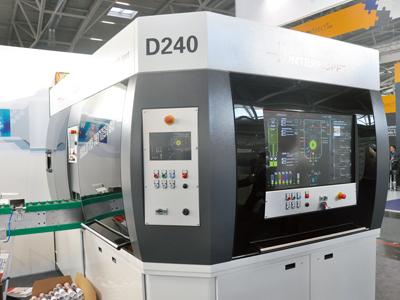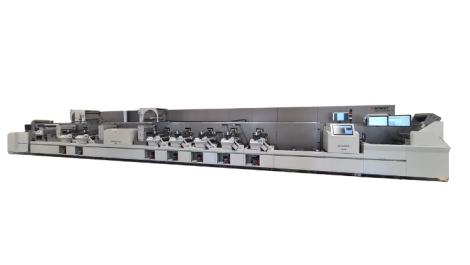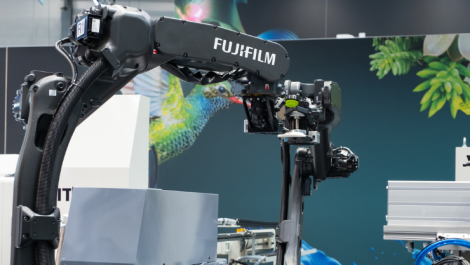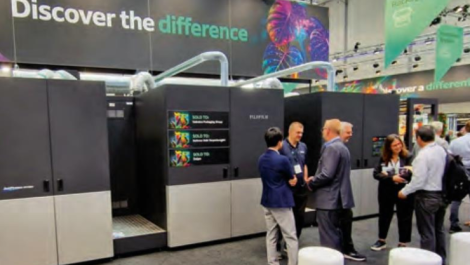Hinterkopf D240 inkjet cylindrical print system.
The recent InPrint show, held in Münich, showcased developments in the very broad arena of functional industrial printing, with several direct to pack digital applications demonstrated. Sean Smyth reports.
There were several packaging applications on show at the exhibition for industrial print technology last month, with emphasis on the much talked about direct to shape inkjet category. While there was plenty of screen and pad printing to be seen, it was digital technology and inkjet that provided most of the interest and excitement.
On the can
While not exactly inkjet, the metal can printer from Tonejet was producing printed cans for the duration of the show. The can printer is being built by US beverage can equipment maker, Patented Machine Builders Inc. The five square metre footprint digital can printer operates in four colour process at 600 dpi, printing 50 to 60 cans per minute with a diameter of 50-90 mm and length up to 200 mm. There is autoload and unload with a clear over-varnishing system and first installations are planned to go live early in the new year.
Tonejet is positive, reporting a number of orders into the USA craft beer sector, and the company showed off samples of flat sheet metal printing. They also have plans to launch a web version for flexibles and labels.
Can printing is an increasingly popular sector, with Italian company Martinenghi talking about the Michelangelo machine for aluminium aerosol cans, beverage bottles and collapsible tubes. INX Digital, part of the Sakata ink company, showed its UV inkjet can printer, the CP100, that features Xaar heads with up to eight colours including white and a top clear coating.
Swiss company wifag-polytype develops a range of speciality printing systems in Friborg and at German subsidiary Mall Herlan. It was developing a single pass inkjet machine for flexible packaging and industrial decoration, but has decided to pull the plug on this project and concentrate on printing cans, tubes and cups in dry offset, screen and inkjet. These systems print UV inkjet in-the-round, with individual servo-motor control on the mandrels, and there are high performance machines combining all print processes, and foiling. For plastics there is a flame treatment station that prepares the surface for printing.
As well as producing bespoke machines, Polytype acts as an integrator, developing building machines for third parties. Another Swiss manufacturer is Hapa AG, which showed the redcube inkjet printing module in a line printed object.
Direct to pack
Hinterkopf is a leading supplier of equipment to print plastic tubes, aluminium tubes and cans, cartridges, bottles, cups, containers, etc. It uses screen, flexo and dry offset with the latest generation equipment featuring inkjet. The company showed the impressive D240 digital printer at the show, where it was printing plastic tubes.
The precision rotary indexing machine is equipped with 16 double mandrel working stations, which can be configured according to requirements. There can be up to eight print stations, white, process colours, two optional spots and a clear coating. The D240 has a very intuitive control panel, with the large touch screen allowing the operator access to the machine status and job queue. It can be used as a standalone machine, or integrated into a wider production line.
The machine at the show was sold to German plastic packaging company Ritter, which already has one machine and reports economic advantages along with environmental benefits, eliminating waste and reducing energy consumption.
Ricoh was promoting its inkjet heads with the first launch of the new Thin Film MEMS manufactured head, and it featured the direct to shape printer from UK company, Cyan Tec.
KBA-Kammann showed a similar hybrid in-the-round printing system for bottles, cans and cups, the K-15 CNC with its flexible configuration and high application range for round, oval, square, cylindrical or conical shapes. This is available as a four colour inkjet module in combination with screen printing, or fully digital with white and process colours.
So, while the InPrint exhibition is aimed at the fast growing industrial functional print sector, there are overlaps with the packaging and label sectors, particularly showing the capabilities of direct to pack applications that are creating a lot of interest.






